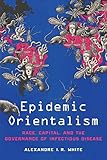Epidemic orientalism : race, capital, and the governance of infectious disease / Alexandre I. R. White.
Publisher: Stanford, California : Stanford University Press, [2023]Description: xviii, 304 pages : illustrations ; 23 cmContent type:- text
- 9781503634121
- 614.409 23/eng/20220628
- RA643 .W385 2023
| Item type | Current library | Shelving location | Call number | Materials specified | Status | Notes | Date due | Barcode | |
|---|---|---|---|---|---|---|---|---|---|
 BOOKs
BOOKs
|
National Law School | General Stacks | 614.409 WHI (Browse shelf(Opens below)) | PB | Checked out | Recommended by Dr. Anindita Adhikari | 03.02.2026 | 40145 |
Includes bibliographical references and index.
Epidemic orientalism -- The International Sanitary Conventions at a colonial scale -- Epidemics under the WHO -- The battle to police disease -- Epidemics, power, and the global management of disease risk -- Pricing pandemics.
"For many residents of Western nations, COVID-19 was the first time they experienced the effects of an uncontrolled epidemic. This is in part due to a series of little-known regulations that have aimed to protect the global north from epidemic threats for the last two centuries, starting with International Sanitary Conferences in 1851 and culminating in the present with the International Health Regulations, who organize epidemic responses through the World Health Organization. Unlike other equity-focused global health initiatives, their mission -- to establish "the maximum protections from infectious disease with the minimum effect on trade and traffic" -- has remained the same since their founding. Using this as his starting point, Alexandre White reveals the Western capitalist interests, racism, and xenophobia, and political power plays underpinning the regulatory efforts that came out of the project to manage the international spread of infectious disease. He examines how these regulations are formatted; how their framers conceive of epidemic spread; and the types of bodies and spaces it is suggested that these regulations map onto. Proposing a modified reinterpretation of Edward Said's concept of orientalism, White invites us to consider "epidemic orientalism" as a framework within which to explore the imperial and colonial roots of modern epidemic disease control"-- Provided by publisher.
There are no comments on this title.
